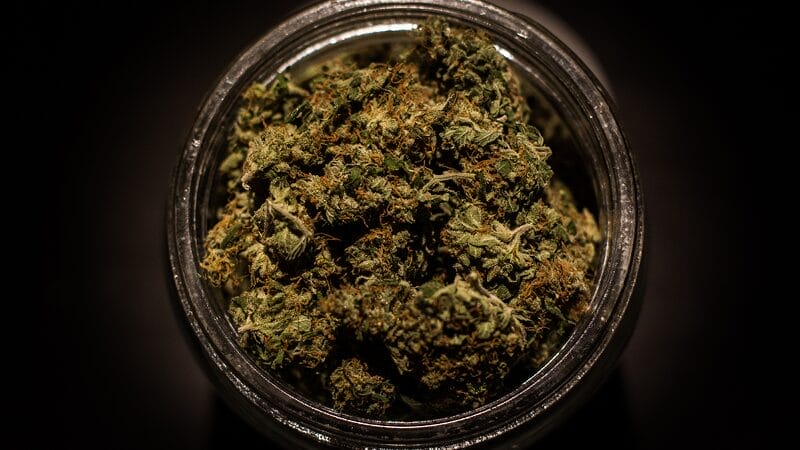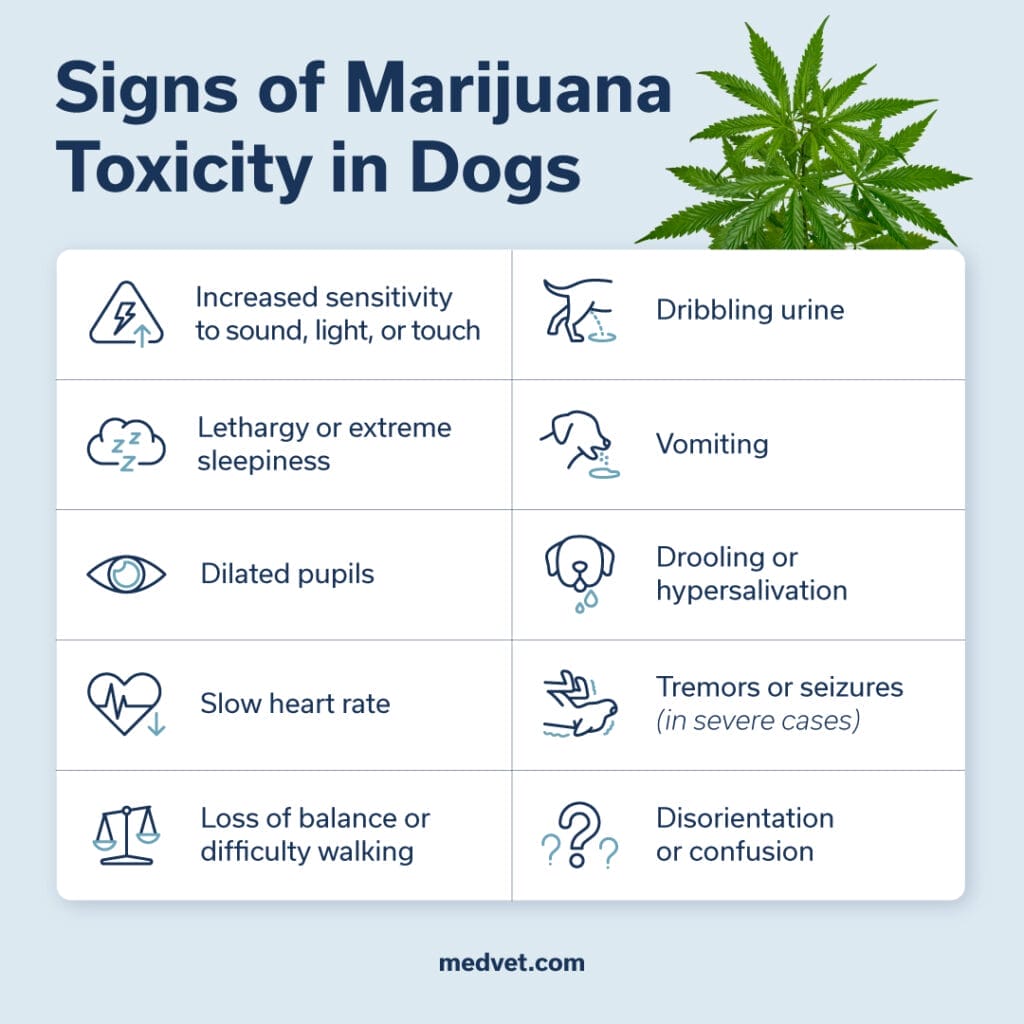
What You Need to Know About Marijuana Intoxication in Dogs
Veterinarians are seeing an increase in marijuana intoxication in dogs, which can be fatal. Learn the signs and seek immediate care.
Marijuana, also known as cannabis and weed, is becoming increasingly common in households due to its legalization in various forms across many states, U.S. territories, and in Washington D.C. While it may have medical benefits for humans, it poses a significant risk to our canine companions. Here’s what every dog owner needs to know about marijuana toxicity in dogs.
What is Marijuana Toxicity in Dogs?
Marijuana contains a psychoactive compound called THC (delta-9-tetrahydrocannabinol), which is toxic to dogs. Unlike humans, dogs have more cannabinoid receptors in their brains, making them much more sensitive to THC. Marijuana toxicity occurs when a dog ingests cannabis, leading to a variety of distressing signs.
Dogs are naturally curious creatures and may ingest marijuana, or weed, in several ways. Some common scenarios include:
- Edibles: Dogs can be attracted to the scent of food, making cannabis-infused edibles like baked goods, candies, or butter particularly enticing.
- Dried cannabis: Dogs may find and ingest dried cannabis directly, either at home or outdoors.
- Second-hand smoke: While less common, dogs can also be affected by inhaling second-hand marijuana smoke. However, ingestion is the most frequent cause of toxicity.

How Much Marijuana is Toxic to Dogs?
Even small amounts of THC can cause signs in some dogs. The severity of the signs depends on the dog’s size, the amount of THC ingested, and the dog’s individual sensitivity.
Signs of Marijuana Toxicity in Dogs
Signs of marijuana toxicity in dogs typically begin within 30 to 90 minutes after ingestion and can last for several hours to several days, depending on the amount consumed. Here are some signs to look for:
- Increased sensitivity to sound, light, or touch
- Lethargy or extreme sleepiness
- Dilated pupils
- Slow heart rate (bradycardia)
- Wobbling, loss of balance, or difficulty walking (ataxia)
- Dribbling urine (urinary incontinence)
- Vomiting
- Drooling or hypersalivation
- Tremors or seizures (in severe cases)
- Disorientation or confusion

What Can Mimic Marijuana Toxicity in Dogs?
Several conditions and toxicities can mimic marijuana toxicity in dogs due to similar signs. Here are some of the most common ones:
- Ethylene glycol (antifreeze) poisoning: Like marijuana poisoning, ethylene glycol poisoning can cause ataxia (loss of balance), lethargy, and seizures. However, it also typically causes increased thirst and urination, vomiting, and kidney failure.
- Alcohol poisoning: Both alcohol and marijuana toxicity can result in lethargy, ataxia, and slowed heart rate. However, alcohol poisoning may also cause respiratory depression and metabolic acidosis.
- Ivermectin toxicity: Ivermectin is an antiparasitic drug that can be toxic to dogs, especially certain breeds like Collies. It can cause signs similar to marijuana toxicity, such as lethargy, ataxia, dilated pupils, and seizures. Additionally, it may also cause blindness and coma.
- Permethrin toxicity: Permethrin is a common ingredient in flea and tick medications for dogs. While safe for most dogs, it can be toxic if ingested in large amounts or applied improperly, especially in cats and small dogs. It can cause seizures, ataxia, and lethargy, mimicking marijuana toxicity.
- Vestibular disease: This is a syndrome that affects a dog’s sense of balance. It can cause signs like ataxia, head tilt, and nystagmus (abnormal eye movements), which may be mistaken for marijuana toxicity. Unlike marijuana toxicity, it typically does not cause lethargy or dilated pupils.
- Hypoglycemia (low blood sugar): This condition can cause lethargy, weakness, seizures, and disorientation, similar to marijuana toxicity. However, it typically does not cause ataxia or dilated pupils.
- Encephalitis or meningitis: These are infections or inflammations of the brain or its membranes. They can cause signs like lethargy, seizures, and disorientation. Additionally, they often also cause fever, neck pain, and other signs of infection.
- Chocolate toxicity: Both marijuana poisoning and chocolate poisoning can cause vomiting, tremors, and seizures. However, chocolate toxicity also leads to restlessness and an increased heart rate, unlike marijuana toxicity.
- Xylitol poisoning: Both can result in seizures and lethargy, although xylitol also causes a dangerous drop in blood sugar and potential liver failure.
If your dog exhibits signs of marijuana, or weed, poisoning or another condition, it’s imperative to seek veterinary care immediately. Providing your veterinarian with a thorough history and all possible details can help them make an accurate diagnosis and provide appropriate treatment.
How is Marijuana Toxicity Diagnosed in Dogs?
If you suspect your dog has ingested marijuana, it’s essential to be honest with your veterinarian. They can diagnose marijuana toxicity based on the dog’s signs and your account of events. In some cases, they may perform a urine test to confirm the presence of THC.
Treatment for Dogs with Marijuana Toxicity
Dogs who may have ingested marijuana need immediate veterinary care. Treatment may include:
- Inducing vomiting: If the ingestion was recent (within 1-2 hours), the veterinarian may induce vomiting to remove the toxin from the system. However, this is not always recommended, as it can sometimes make signs worse.
- Activated charcoal: This can help absorb the toxins in the stomach and intestines.
- IV fluids: To help flush out the toxins, maintain hydration, and support your dog’s body systems.
- Supportive care: This may include monitoring vital signs, warming or cooling therapy (hypothermia is common), providing a quiet environment, and administering medications to control seizures, reduce anxiety, or manage other signs.
Most dogs recover from marijuana (weed) poisoning within 24-72 hours with appropriate treatment. However, severe cases can be life-threatening, especially if your dog has ingested a large amount of THC or has other health issues.

Preventing Marijuana Intoxication in Dogs
Here are some tips to keep your canine safe from marijuana ingestion:
- Keep all cannabis products out of reach: Store them safely and securely, just like you would with any other medication or toxic substance.
- Be cautious with edibles: Keep cannabis-infused foods locked away and dispose of wrappers and containers responsibly.
- Educate others: Ensure that family members, friends, and guests are aware of the danger marijuana poses to your dog.
- Proper disposal: Dispose of cannabis waste responsibly to prevent your dog from accessing it.
- Avoid second-hand smoke: If you smoke marijuana, do so away from your dog to minimize their exposure to the smoke.
Marijuana (weed) toxicity in dogs is a serious issue that all pet owners should be aware of. By recognizing the signs, understanding the similarities to other toxicities, knowing how to prevent and treat it, and being cautious with cannabis-derived products, you can help keep your pet safe. Always remember that if you suspect your dog has ingested marijuana, seek care from your family veterinarian or nearest emergency hospital like MedVet immediately.
Learn more ways to keep your pets healthy and safe.
FAQs
What is marijuana toxicity in dogs?
What can mimic marijuana toxicity in dogs?
How are dogs with marijuana toxicity treated?
Learn More
For ways to ensure your pet lives a happier, healthier life, visit our Pet Care Resources library.
Pet Care ResourcesContents
Learn More
For ways to ensure your pet lives a happier, healthier life, visit our Pet Care Resources library.
Pet Care Resources
